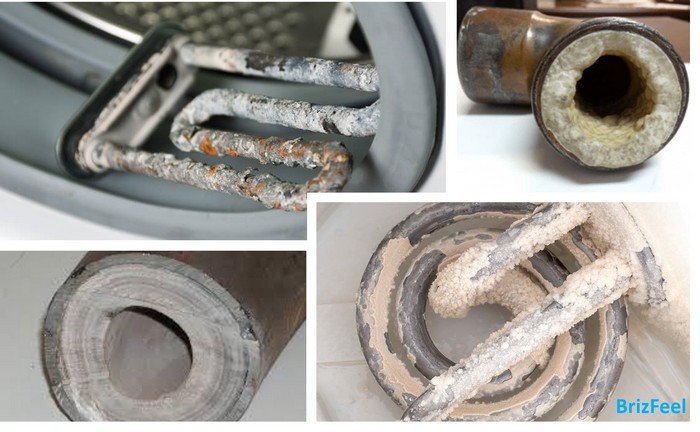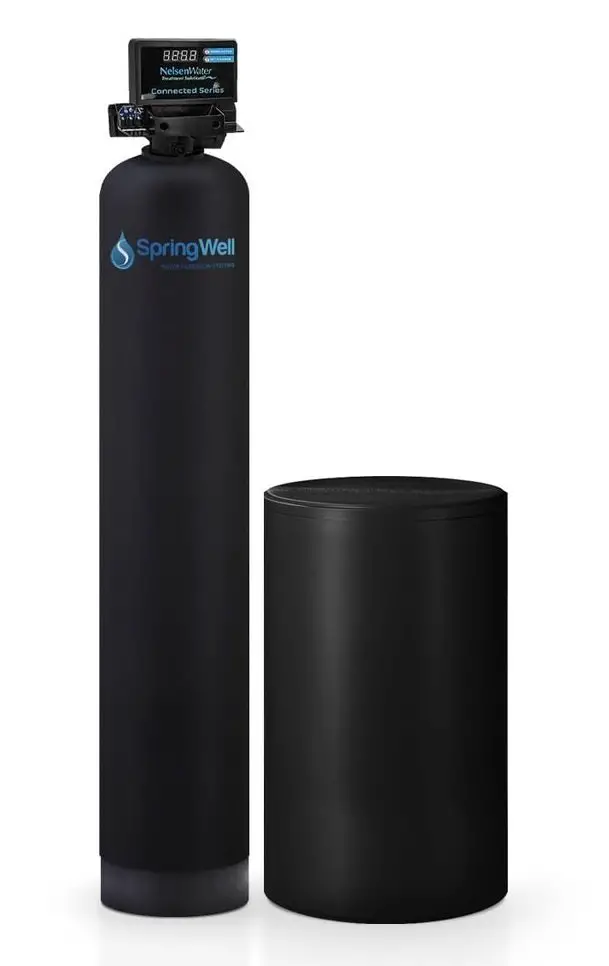When you run water at home, you expect it to be smooth-running and relatively quiet, right?
Well, what do you do when that isn’t the case?
On occasion, things can cause mysterious problems with your running water.
One common problem is issues with your water softener.
And you might be asking “why is my water softener making noise?!”
Well, fear not, because we’re about to tell you all the details you need to know about your water softener and why it might be making those funny noises.
What is Water Softener?
Water softener is a water treatment system that is part of the water system.
It is designed to help filter out the minerals that cause hard water (hard water gets its name from the hard mineral deposits it consists of and causes).
These minerals include things like calcium and magnesium, and high concentrations of them can build up over time and cause major issues…not to mention look pretty gross.

Water softener acts like a magnet. As the hard water passes through a negatively charged terminal, it pulls the positively charged calcium and magnesium particles away, leaving your water softer for you and everything it touches!
Common Reasons Why Your Water Softener May be Making Noise
Here are some common reasons why your water softener may be making noise:
- Air in the System
If your water softener is making a gurgling or hissing noise, it may be due to air in the system. This can happen if there is a leak in the water line or if the water pressure is too low. To fix this issue, check for leaks and adjust the water pressure as needed.
- Resin Beads
Water softeners use resin beads to remove minerals from the water. Over time, these beads can become loose and create a rattling noise in the tank. To fix this issue, you may need to replace the resin beads or contact a professional to inspect and repair your water softener.
- Clogs
Clogs in the system can also cause noise in your water softener. This can happen if sediment or other debris accumulates in the tank or in the pipes leading to and from the softener. To prevent clogs, make sure to clean your water softener regularly and use a sediment filter if necessary.
- Valve Problems
If the valve in your water softener is not functioning properly, it can lead to noise and other issues. Common valve problems include leaks, clogs, and worn-out seals. In this case, you may need to have the valve replaced or repaired by a professional.
In short, there are several reasons why your water softener may be making noise.
By identifying the source of the noise and taking appropriate action, you can ensure that your water softener is functioning properly and providing you with clean, soft water.
If you are unable to identify the source of the noise or if you are unsure how to fix the problem, it is always best to contact a professional for assistance.
Different Types of Sound Made by Water Softeners & The Possible Causes
Many different noises can come from your water softener. These noises range from tiny noises to much more alarming sounds, and each of them could be caused by different things that may or may not be cause for concern. Let’s explore.
Hissing Sound
Hissing noises from your water softener could be caused by a few things. If your hard mineral build-up gets into the little gaps near the valve seals, the water pressure gets out of balance and can cause water to leak out around those seals of your water softener. Hissing sounds could also be caused by cracks in the water line coming into the water softener.
Loud Humming Sound
A humming sound from your water softener could be part of your regeneration process, which is no cause for alarm on your part, or it could be caused by air pressure being off. It could even be the hum of the motor as it pumps the water if your home has an electric water softener.
Running or Trickling Water Sound
Water softener running water sound can be a totally normal noise from your water softener, but trickling water could be a sign that your valves aren’t sealing properly. This could be caused by normal wear and tear and is definitely something I’d recommend keeping an ear out for.
Timer Motor Sound
If you have an electric water softener, part of the system will include a timer motor that controls when your water softener will regenerate. Sometimes these gears inside that motor will make a clicking or ticking noise as they touch each other. It’s a totally normal sound, so there is no need to worry!
Vibrating Pipe Sound
The sound of pipes vibrating in your water treatment system is rarely normal, so keep an ear out for this one. Some of the causes can be improper installation, an overloaded system, the water pressure being too high, or you are trying to use water during the regeneration cycle.
Clicking Sound
This could be related to the timer motor and be completely normal. Still, it could also be caused by broken teeth in the gears of your water softener, which is usually caused by a harder than usual resistance against said teeth.
Clanking or Banging Sound
A few of the causes for clanking or banging noises from your water softener can be pressure fluctuations from mineral build-up around the intake or air pockets formed around the valves when they release (this one is tough to re-create, which means it can be hard to diagnose).
What Does Water Softener Regeneration Sound Like?
Water softener regeneration is when your water softener cleans itself. The system flushes itself and the negatively charged filter with water and salt, which is positively charged, and it causes all that built-up calcium and magnesium to detach from the resin bed and run out along with the salty water, leaving your water softener refreshed and ready to start all over again.
When the regeneration process is going, you’ll likely hear two specific sounds. The first will be a lot of flowing water, which is the tank filling up with that salty water. Then you’ll have a similar sound when it performs its rinse cycle.
Keep in mind that different water softener systems may sound different.
For example, a Culligan water softener could make different noises from any other brand. If you hear a beeping sound coming from your water softener, that is quite possibly the low salt alarm or annual service reminder.
Basically, if it starts making noise other than running water and a low hum from the motor when it’s regenerating, that’s when you may have a problem, and I would recommend getting someone out to check on that.
Culligan-specific Water Softener Regeneration Sounds
If your Culligan water softener has hissing noise, it could mean that it has the wrong type of salt or is low on salt.
How Do I Fix My Water Softener When It’s Making Noises?
If your water softener making noises aside from the tick of the timer motor or the running water of the regeneration cycle, the smartest thing to do is get a licensed plumber out to take a look.
You may need to replace a motor or gear, seal a leak in the hose, clean out an opening, or even fix a computer error.
Unless you are a professional, playing around with your plumbing is more likely to cause harm than do any good.
A smart thing to do in this instance is to record the sound for your plumber in case it decides to stop making it when they show up (you know how tricky those machines can be). Know your limitations, and never be afraid to ask for help!
Maintenance Tips: Keeping Your Water Softener Quiet and Functioning Properly
Proper maintenance is key to ensuring that your water softener stays quiet and functions properly. Here are some maintenance tips to keep your water softener in top condition:
- Regular Cleaning: Cleaning your water softener is an important step in preventing clogs and ensuring proper function. Be sure to follow the manufacturer’s instructions for cleaning and maintenance, and clean the tank and resin beads regularly.
- Check Salt Levels: Salt is a crucial component of a water softener, as it helps regenerate the resin beads that remove minerals from your water. Make sure to check your salt levels regularly and add salt as needed.
- Keep Tank Dry: Excessive moisture in the tank can lead to bacterial growth and other issues. To prevent this, make sure to keep the tank dry by draining excess water regularly and wiping down the interior of the tank.
- Use High-Quality Salt: Not all water softener salts are created equal. To ensure proper function and prevent clogs, use high-quality salt that is specifically designed for use in water softeners.
- Test Water Quality: Regularly testing your water quality can help you identify issues with your water softener and prevent potential problems. Consider investing in a water testing kit or having your water professionally tested to ensure that your water softener is working properly.
By following these maintenance tips, you can keep your water softener running smoothly and prevent noise and other issues from occurring.
If you are unsure how to properly maintain your water softener or if you are experiencing ongoing noise or other problems, it is always best to consult with a professional for assistance.
When to Call a Professional: Signs that You Need Expert Assistance
While regular maintenance can help prevent many issues with your water softener, there may be times when you need to call in a professional for assistance.
Here are some signs that you should contact an expert for help with your water softener:
- Excessive Noise: While some noise is normal, excessive or unusual sounds can be a sign of a more serious problem. If your water softener is making loud or persistent noises, it’s a good idea to have it inspected by a professional.
- Water Quality Issues: If you notice a decrease in water quality, such as a change in taste, smell, or color, this could be a sign that your water softener is not working properly. A professional can help diagnose and fix the issue.
- Constant Clogs: If you find yourself dealing with frequent clogs or blockages, this could be a sign of a problem with your water softener. A professional can help determine the cause and provide a solution.
- Leaks: Any signs of leaking around your water softener should be addressed immediately. A professional can help locate the source of the leak and make necessary repairs.
- Electrical Issues: If your water softener is experiencing electrical issues, such as short circuits or blown fuses, it’s important to contact a professional for assistance. Working with electricity can be dangerous and should only be done by trained professionals.
If you experience any of these signs or other issues with your water softener, it’s important to contact a professional for assistance. Ignoring these problems can lead to more serious issues down the line and may end up costing you more in repairs or replacements.
A qualified technician can help diagnose and fix the issue quickly and efficiently, ensuring that your water softener continues to function properly for years to come.
FAQ
Here are some frequently asked questions (FAQs) about water softeners and the noise they may produce:
1. Can I still use my water softener if it’s making noise?
It is not recommended to use your water softener when it’s regenerating. Other noises, maybe…but I would recommend erring on the side of caution.
2. What are some common causes of noise from water softeners?
There are several potential causes of noise from water softeners, including the motor, the brine tank, the resin tank, or the valve system. Some common reasons for noise include clogs or blockages, broken or worn parts, or issues with the electrical system.
3. Is it normal for a water softener to make noise?
Some noise is normal for a water softener, particularly during the regeneration process. However, excessive or unusual sounds may indicate a problem that requires attention.
4. Is my water softener supposed to make noise?
As it is a water treatment system made up of many moving parts, yes, your water softener will make some noises. Hopefully, this article will help to separate the normal from the abnormal for you.
5. How can I tell if my water softener is making too much noise?
If you notice that your water softener is making unusually loud or persistent noises, or if you hear new or unusual sounds, this may be a sign that something is wrong.
6. What should I do if my water softener is making noise?
If you notice noise coming from your water softener, start by checking for any obvious issues, such as clogs or blockages. If you can’t find the source of the problem, or if you’re not comfortable performing repairs on your own, it’s best to call a professional for assistance.
7. Can I prevent my water softener from making noise?
Regular maintenance and cleaning can help prevent many issues that can lead to noise from your water softener. Be sure to follow the manufacturer’s instructions for cleaning and maintenance, and consider investing in high-quality salt and other supplies.
Conclusion on Why My Water Softener Making Noise
To sum up, some of the noises you will hear from your water softener are totally normal and easily explained. If there are any odd noises, listen to see where they’re coming from.
Also, make sure you know what does water softener regeneration sound like as it is a completely normal process of a water softener. I hope this article helps you to identify the water softener problems and find a remedy!
Read Next:

